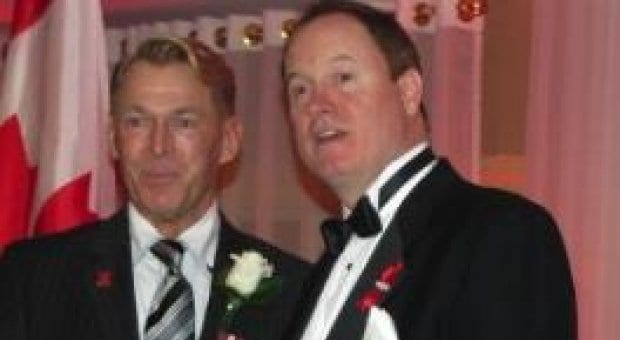Long-time HIV-positive activist Bradford McIntyre is dedicating his new Queen’s Diamond Jubilee Medal to others infected and affected by the virus.
“All the people who aren’t here with us, those we have lost, I feel like I carry them with me,” the 60-year-old tells Xtra. “I feel like they are my support, and I feel like they are responsible for why I am here today.”
McIntyre received the Queen’s medal on Nov 27 at the Canadian AIDS Society’s fifth annual World AIDS Day Gala at the Château Cartier in Gatineau, Quebec. He was among five British Columbians and 30 Canadians recognized for their exemplary work and service in the field of HIV/AIDS in Canada.
Invited to select its 30 recipients by the Office of the Secretary to the Governor General, the Canadian AIDS Society issued a call for nominations nationally and received dozens of responses. An independent selection committee reviewed the nominations and selected the recipients that were then presented to the Chancellery of Honours for approval.
When McIntyre was diagnosed with HIV in 1984 and told he had six months to live, he left Kitchener-Waterloo and moved to Ottawa, intending to live his final months in isolation. But the warning period passed, as did the next 18-months-to-live warning, and the following five-more-months warning. Finally McIntyre, who had segregated himself from his family and friends to await death, decided to live.
“I lived in fear for a number of years, and then I didn’t die and decided I had to get on with my life,” he says.
McIntyre started eating right, reading self-help books, going to workshops and seminars and enrolling in reflexology and reiki classes.
“As I worked on my health physically, I also began to heal emotionally, mentally and spiritually,” he says.
McIntyre didn’t disclose his HIV status until a decade after he was diagnosed for fear of stigma and discrimination. It was during a 1994 visit to Vancouver, while standing on the Burrard Street bridge, that he decided to return to Ontario and come out publicly about his HIV status. He wanted others who were positive to know they were not alone.
In 1997, two years after moving to Vancouver, McIntyre developed pneumonia and began antiretroviral therapy. Today, his viral load is undetectable, thanks to a healthy lifestyle, positive outlook and success with medications, he says.
McIntyre says his positive outlook and good health have allowed him to devote the past two decades to telling his story. He has hosted lectures and conducted numerous workshops on HIV/AIDS, runs a popular website, and has held various board-member positions with an array of organizations, including the International AIDS Society, AIDS Vancouver, the Human Rights Campaign, the Canadian HIV Legal Network, Positive Living BC, Friends for Life and the BC Compassion Club Society.
McIntyre was also the director of the Snowy Owl Aids Foundation and director of the former Face Forward Foundation, which helped subsidize medically implemented synthetic filler injections for HIV-positive people experiencing facial wasting/lipoatrophy due to side effects of the virus and its treatments.
McIntyre, now on his second term as vice-chair of AIDS Vancouver, was nominated for the medal by the organization’s executive director, Brian Chittock.
“The Queen’s Diamond Jubilee award comes around once in a lifetime. It was a perfect opportunity for us to nominate Bradford for all the work he’s done for a very long time, not only in Vancouver, but throughout Canada,” Chittock says.
“He is not only working for the cause, he’s part of the cause, and that’s a distinction as well,” Chittock adds.
In addition to sitting on boards and speaking publicly, McIntyre manages Positively Positive, which, since 2003, has provided tools to help people with HIV lead healthy lives.
“Many people all over the world go to his website to obtain current information pertaining to HIV,” Chittock says.
Asked why he got involved in HIV/AIDS activism, McIntyre pauses.
“I didn’t want anyone to go through what I went through when I was diagnosed,” he replies.
“I never had the idea or decision to do any of the things I’ve done all these years,” he adds. “All I’ve done is say yes when people have asked me to speak and volunteer.
“The things I’ve done have been beyond what I could have dreamed up,” he continues. “They are the things that have been the highlight of my life.”

 Why you can trust Xtra
Why you can trust Xtra


